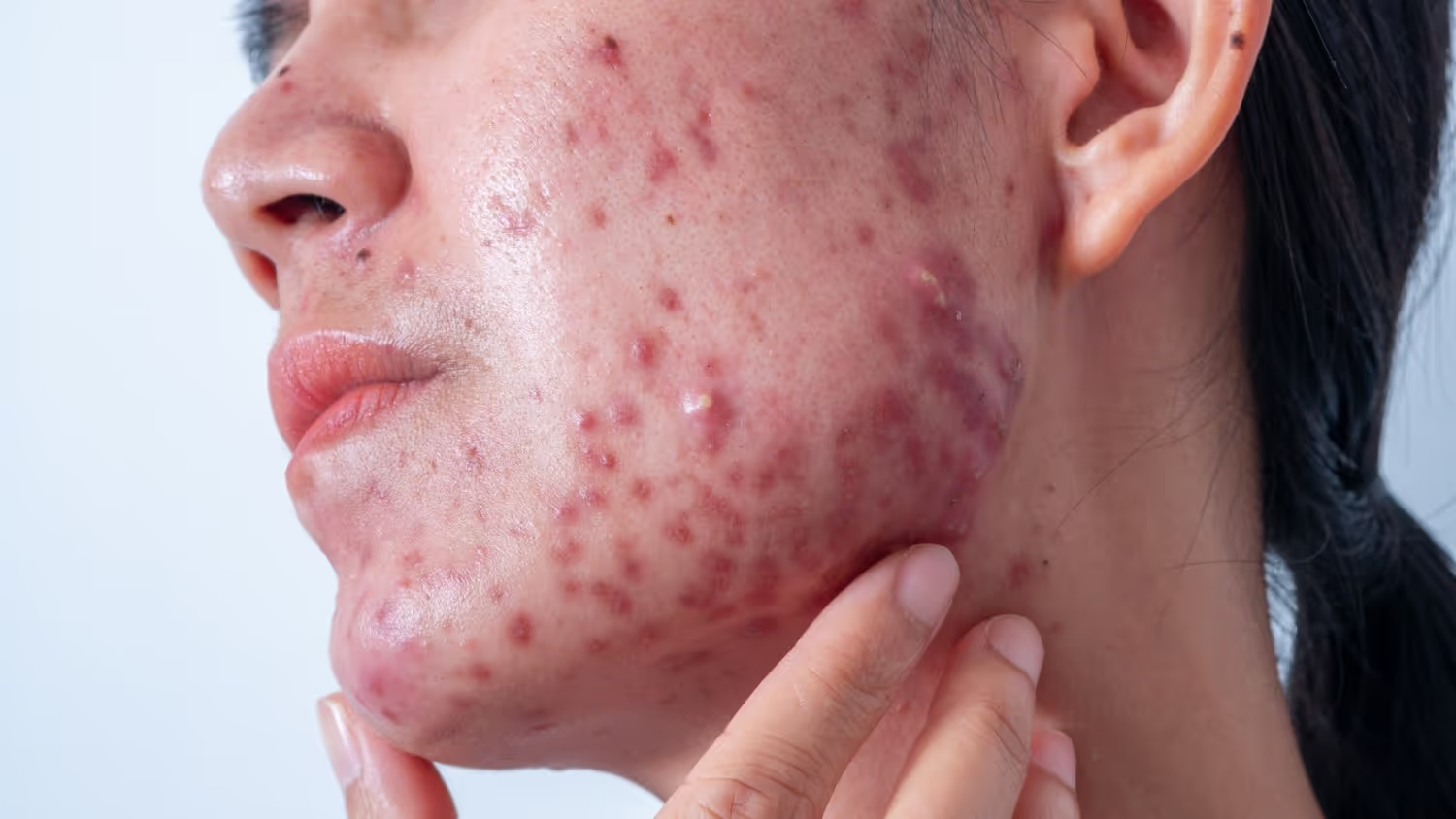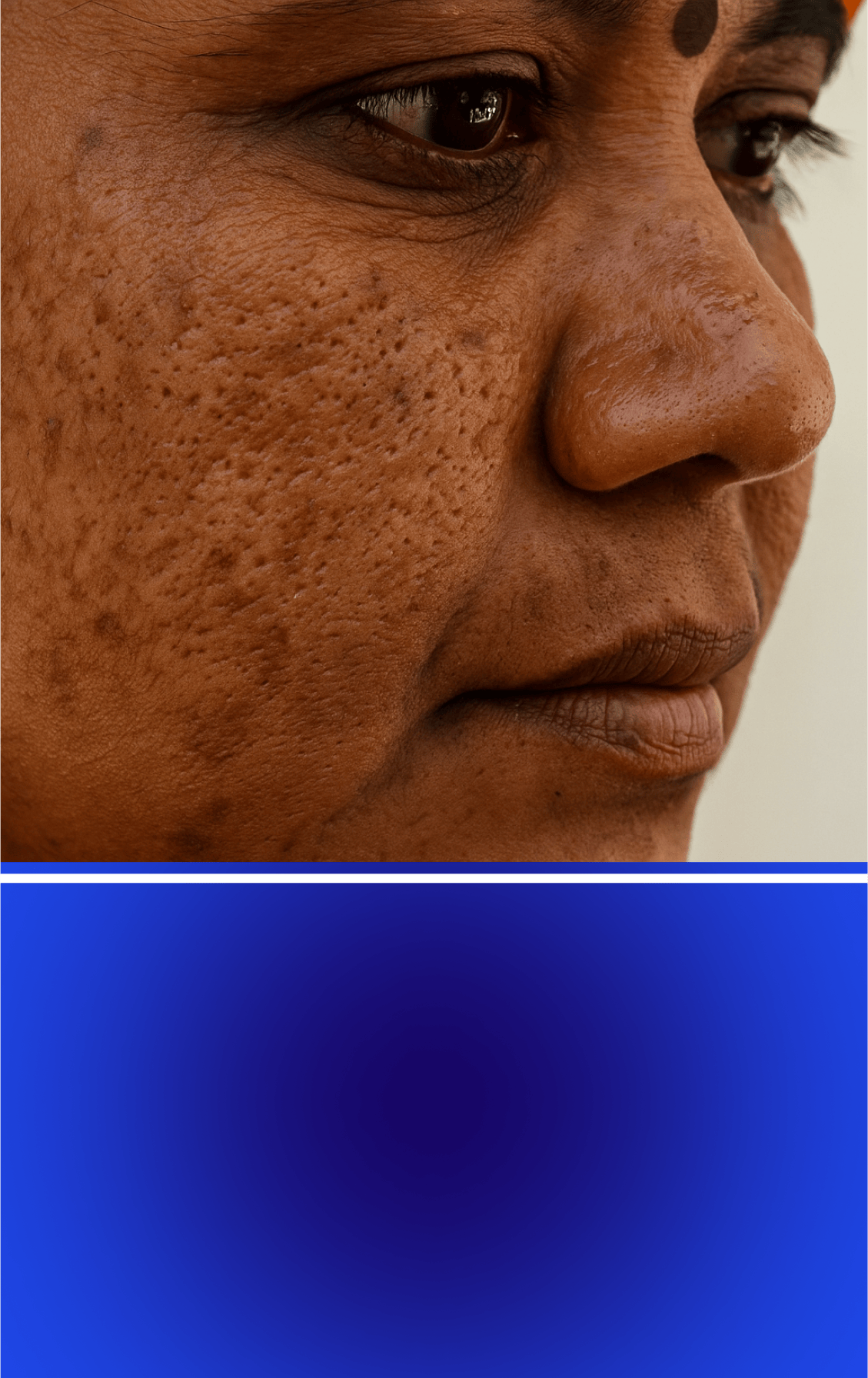The connection between diet and skin health has garnered increasing attention in dermatological research. While genetics and skincare routines undoubtedly influence skin appearance, emerging evidence highlights the significant role of nutrition, particularly for individuals experiencing persistent breakouts. A well-structured hormonal acne diet can help regulate inflammation and support the body's healing mechanisms, contributing to clearer, healthier skin from within.
We understand how frustrating it can be to deal with persistent acne and the overwhelming amount of conflicting advice out there. Navigating dietary changes while managing breakouts can feel confusing and discouraging, but you're not alone on this journey. Hormonal fluctuations, such as those during puberty, menstruation, or periods of high stress, are known acne triggers. Certain foods can intensify these imbalances, while others help stabilise hormonal activity.
As a result, dermatologists now often recommend dietary adjustments as part of a holistic acne management plan. This evidence-based guide outlines foods to include or avoid, explaining how a targeted hormonal acne diet complements medical therapies and addresses the root causes of acne, offering a practical and sustainable path to long-term skin health.
Overview
- A hormonal acne diet helps manage adult acne by addressing root hormonal and inflammatory causes through strategic food choices.
- Foods can either trigger or reduce breakouts by influencing insulin, androgens, and inflammatory pathways.
- Traditional Indian diets can be adapted to meet the dietary needs of those with hormonal acne without sacrificing cultural preferences.
- Supplements like zinc and omega-3 fatty acids may offer additional support when deficiencies or severe symptoms are present.
- Lasting success comes from integrating nutrition with medical care, stress reduction, and lifestyle improvements for a holistic skin strategy.
Understanding the Relationship Between Diet and Skin Health
The intricate connection between nutrition and skin appearance extends beyond simple surface-level changes. Scientific research reveals complex mechanisms through which dietary choices influence hormonal balance and inflammatory responses in the body.
Scientific Evidence Linking Diet to Acne
Clinical studies have demonstrated a significant correlation between certain foods and the development of acne. Research published in the Journal of the American Academy of Dermatology shows that high-glycemic diets can worsen acne symptoms by 25-30% in susceptible individuals. The mechanisms involve insulin spikes that trigger sebaceous gland activity, leading to increased oil production.
Dairy consumption studies reveal concerning connections to the severity of acne. A 2023 meta-analysis involving over 78,000 participants found that consuming dairy products (milk, yoghurt, cheese) was significantly associated with an increased risk of acne, consistent with a 44% higher risk among those with high dairy intake. These findings support the need for careful consideration of dairy intake in planning diets for hormonal acne.
Hormonal Pathways and Skin Function
Hormonal influences on the skin form the foundation of understanding how dietary and endocrine factors contribute to acne development.
- IGF-1 increases in response to high-glycemic foods, leading to elevated androgen levels, increased oil production, and skin inflammation.
- This hormonal cascade highlights the importance of managing blood sugar for clearer skin.
- DHT, a potent androgen, enlarges sebaceous glands and boosts sebum output, aggravating acne.
- Some foods increase the skin's sensitivity to androgens, hormones that can intensify acne flare-ups during hormonal changes.
- Recognising these mechanisms supports the rationale behind adopting a hormonal acne diet.
Inflammatory Responses Triggered by Food
Systemic inflammation has a significant impact on skin health through multiple pathways. Pro-inflammatory foods trigger the release of cytokines, which can exacerbate existing acne lesions and prolong the healing process. The gut-skin axis refers to the relationship in which gut health influences skin condition through inflammatory chemicals released during the digestive process.
Individual variations in inflammatory responses explain why some people react strongly to specific foods, whilst others remain unaffected. Genetic factors influence how effectively the body processes certain nutrients and manages inflammatory responses, highlighting the importance of personalised dietary approaches.
The Science Behind Hormonal Acne and Nutrition

Hormonal acne presents unique challenges that differ significantly from teenage breakouts. Understanding these distinctions helps create more effective treatment strategies that address root causes rather than just surface symptoms.
Understanding Hormonal Acne Patterns
Adult hormonal acne typically manifests along the jawline, chin, and lower cheeks, following a cyclical pattern that correlates with hormonal fluctuations. Research indicates that 85% of women aged 25-35 experience some form of hormonal acne, with severity varying based on individual hormone sensitivity and lifestyle factors.
The difference between teenage and adult acne lies primarily in the underlying causes. Teenage acne results from puberty-related hormone surges, whilst adult acne often stems from stress, dietary factors, and hormonal imbalances. This distinction makes dietary intervention particularly effective for adult cases.
Dietary Triggers for Hormonal Imbalance
Identifying and avoiding common dietary triggers can help reduce hormonal fluctuations that contribute to the development of acne.
- High-glycemic foods, such as white rice, refined wheat, and processed snacks, spike insulin levels, which in turn increase IGF-1 and exacerbate inflammation.
- Elevated IGF-1 levels increase sebaceous gland activity, resulting in increased oil production on the skin, which contributes to the development of acne.
- Dairy products contain hormones and growth factors that may interfere with the body's hormonal balance.
- Whey protein, commonly found in processed foods and supplements, can increase insulin and IGF-1 levels, potentially exacerbating acne-prone skin.
- Managing these dietary triggers is crucial when developing a personalised hormonal acne diet.
Indian Diet Context and Acne
Traditional South Indian foods, such as white rice and refined wheat products, have high glycemic indices that can trigger acne flare-ups. Modern dietary shifts toward processed foods and increased dairy consumption have coincided with a rise in acne prevalence among urban populations.
Cultural food practises often centre around carbohydrate-rich meals that can challenge blood sugar control. However, traditional fermented foods like idli and dosa batter contain beneficial probiotics that support gut health and may improve skin conditions when incorporated thoughtfully into a diet for hormonal acne.
Evidence-Based Foods to Include for Clearer Skin

Strategic food choices can significantly impact skin health by addressing underlying inflammatory processes and hormonal imbalances. Research-backed nutrients provide natural support for clearer, healthier skin when consistently incorporated into daily meals.
- Omega-3 fatty acids from fatty fish (like salmon and sardines) reduce inflammatory markers and help regulate sebum production.
- Vegetarian omega-3 sources, such as flaxseeds, chia seeds, and walnuts, provide ALA, which the body converts into EPA and DHA.
- Probiotic-rich foods, such as buttermilk, homemade yoghurt, and fermented idli batter, support a healthy gut microbiome, which is linked to improved skin health.
- High-fibre foods, including brown rice, quinoa, and millets, aid in hormone metabolism and stabilise blood sugar, helping to reduce acne triggers.
- Antioxidant-rich foods such as colourful fruits, vegetables, and Indian spices like turmeric provide anti-inflammatory benefits and aid in skin repair.
- Zinc-rich foods, including pumpkin seeds, lentils, chickpeas, eggs, and lean meats, promote skin healing and regulate oil production.
Foods to Limit or Avoid for Hormonal Acne
Identifying and reducing problematic foods forms a crucial component of successful acne management. While individual responses vary, specific food categories consistently exhibit strong associations with the development and severity of acne.
- High-glycemic index foods, such as white rice, refined wheat products, and processed snacks, rapidly raise blood sugar levels, which in turn increase IGF-1 and oil production. Healthier substitutes, such as brown rice, quinoa, and whole-grain rotis, support glycemic control while respecting cultural preferences.
- Dairy products, particularly skim milk and whey protein, are associated with an increased severity of acne due to their hormonal content and insulin response. Calcium-rich alternatives, such as sesame seeds, leafy greens, and almonds, help meet nutritional needs without the hormonal effects associated with dairy.
- Refined sugars found in packaged foods trigger insulin spikes and inflammation, which can exacerbate acne. Common hidden sugars include maltodextrin and dextrose. Reading food labels is crucial for identifying added sugars; natural alternatives like stevia or monk fruit are safer options for individuals prone to acne.
- Omega-6 fatty acid excess from oils like sunflower or safflower promotes inflammation; this imbalance worsens acne when omega-3 fatty acids are lacking. Healthier oil options include olive oil, avocado oil, and coconut oil, which help maintain an anti-inflammatory dietary profile.
Targeted Nutritional Interventions

Strategic meal planning and targeted nutritional approaches can optimise the benefits of a hormonal acne diet. These evidence-based interventions address specific mechanisms underlying acne development whilst supporting overall health and well-being.
- Balanced macronutrient intake at each meal—combining protein, healthy fats, and complex carbs, helps stabilise blood sugar and reduce insulin-driven flare-ups.
- Protein-rich breakfasts help regulate cortisol levels, while avoiding late-night meals supports a healthy circadian rhythm and reduces hormonal disruption.
- Adequate water intake helps maintain skin hydration and aids in the removal of metabolic waste that can exacerbate acne.
- Green tea offers anti-inflammatory polyphenols that benefit acne-prone skin.
- Spearmint tea may reduce excess androgens, providing added support in women with hormonally driven breakouts.
Professional guidance can help optimise your hormonal acne diet for maximum effectiveness. Expert dermatologist at Velantis Dermatology offer comprehensive assessments to identify your specific triggers and create personalised treatment plans.
Evidence-Based Supplements for Skin Health
While a well-designed hormonal acne diet provides the foundation for clearer skin, targeted supplementation may offer additional benefits for individuals with specific deficiencies or severe symptoms.
- Zinc supplementation has been shown to reduce inflammatory acne lesions by 40–50% within 12 weeks. The recommended dosage is 30–40 mg daily, taken with food to minimise gastrointestinal discomfort. Zinc picolinate and bisglycinate have higher absorption rates than zinc oxide or sulphate; long-term supplementation requires monitoring copper levels due to zinc's interference with copper absorption.
- Omega-3 supplements help reduce inflammation when dietary intake is inadequate. A daily dose of 1–2 grams of combined EPA and DHA is effective in reducing inflammatory markers associated with acne.
- Algae-based omega-3 options serve as ideal alternatives for individuals following plant-based diets, providing EPA and DHA without the use of fish-based ingredients.
- Spearmint tea, consumed twice daily, has demonstrated a 30% reduction in free testosterone levels in women, potentially lowering androgen-driven breakouts.
- Green tea extract, rich in polyphenols, offers anti-inflammatory benefits that may complement a hormonal acne diet and support clearer skin.
Comprehensive Lifestyle Integration

Successful acne management extends beyond dietary changes to encompass comprehensive lifestyle modifications that support hormonal balance and overall skin health.
- Chronic stress increases cortisol, a hormone linked to elevated oil production and inflammatory acne. Evidence supports stress-reduction methods such as yoga, meditation, and deep breathing as valuable adjuncts to nutritional interventions. Nutritional stress support includes adequate intake of magnesium and B vitamins. Dark leafy greens, seeds, and nuts provide these micronutrients, promoting nervous system health and reducing stress-induced hormonal imbalances.
- Consistent, high-quality sleep enhances skin healing and hormonal balance. Deep sleep promotes the release of growth hormone, which supports tissue repair and reduces inflammation that can trigger acne.
- Avoiding large meals close to bedtime may reduce cortisol spikes and improve sleep quality. Establishing a regular sleep-wake cycle helps regulate the secretion of hormones driven by the circadian rhythm, notably cortisol and melatonin.
- Regular physical activity improves insulin sensitivity and lowers circulating androgen levels. Moderate-intensity exercise, such as brisk walking or strength training, is most effective in supporting hormonal balance without exacerbating acne.
- Post-exercise hygiene, including prompt cleansing, minimises sweat-related pore blockage and prevents bacterial overgrowth, which can worsen acne in active individuals.
Timeline and Realistic Expectations
Setting realistic expectations is essential when starting a hormonal acne diet. While some improvements may be noticeable within 2 to 4 weeks, significant changes typically require 8 to 12 weeks of consistent adherence. Gradual adjustments are often more sustainable than sudden changes, helping maintain long-term commitment and better results.
Tracking progress through food and skin diaries, along with regular photos, can help identify trigger foods and show subtle improvements over time. Responses vary widely, so patience is key. Some individuals see rapid progress, while others experience slower, steady changes that emerge over several months.
For comprehensive acne management that combines dietary approaches with professional treatments, the experienced team at Velantis Dermatology can provide personalised guidance and monitor your progress throughout your journey to clearer skin.
Personalised Approach Considerations
A successful hormonal acne diet must be tailored to each individual, taking into account genetic makeup, age, lifestyle, and cultural preferences. Genetic differences can impact how the body processes insulin, handles inflammation, and regulates hormones, all of which influence the effectiveness of dietary changes. Adults between 28 and 50 may also need specific adjustments due to age-related hormonal shifts and metabolic changes.
For long-term success, dietary recommendations should align with cultural habits and practical realities. In South Indian households, this may involve modifying traditional recipes and opting for affordable, nutrient-dense foods such as lentils, seasonal vegetables, and local grains. These adaptations help maintain both skin health and dietary sustainability.
Professional Guidance and Medical Integration

While dietary changes can help manage acne, effective treatment is best achieved with medical guidance, particularly in severe or cystic cases. A board-certified dermatologist can determine whether dietary adjustments are enough or if additional treatments like retinoids or oral medications are needed.
Coordinating nutritional strategies with clinical care improves results and prevents harmful interactions. Avoiding unsupervised diets and online fads ensures balanced, evidence-based care that supports long-term skin health and overall wellness.
Velantis Dermatology offers a comprehensive and patient-focused approach to acne care. Their experienced team combines medical treatment with lifestyle and nutrition support to ensure lasting results.
At Velantis Dermatology, patients benefit from:
- Full acne evaluations that consider diet, lifestyle, and medical history
- Advanced treatment options such as retinoids, antibiotics, peels, and lasers
- Nutrition support tailored for acne-prone skin
- Ongoing treatment monitoring and personalised adjustments
- Evidence-based care with realistic timelines and clear guidance
Conclusion
A well-structured hormonal acne diet serves as a clinically supported approach to managing adult acne by targeting underlying hormonal and inflammatory pathways. Emphasising anti-inflammatory foods, stabilising blood sugar levels, and reducing known dietary triggers forms the core of this strategy. While results may take time, consistency and realistic expectations are crucial for success, as the skin gradually responds to nutritional improvements.
Incorporating professional medical guidance enhances the effectiveness and safety of dietary interventions. Dermatologists can provide personalised treatment plans that align with individual needs, often combining nutrition with appropriate medical therapies and lifestyle modifications. With a balanced, evidence-based approach and sustained commitment, a hormonal acne diet can play a meaningful role in achieving clearer skin and supporting long-term health.
Ready to transform your skin with a personalised approach that combines evidence-based nutrition with professional dermatological care? Contact Velantis Dermatology today to schedule a comprehensive consultation and develop a customised treatment plan that addresses your unique skin concerns and lifestyle needs.
FAQs
Q1. How quickly will I see results from dietary changes?
A1. Initial dietary changes may show effects within 2-4 weeks, but significant improvements usually require 8-12 weeks of consistent adherence; some individuals may experience temporary worsening as the body adjusts.
Q2. Can I eat any dairy products if I have hormonal acne?
A2. Research indicates a strong correlation between dairy intake and acne, particularly with skim milk and whey protein. Fermented options, such as yoghurt, may be better tolerated, although individual responses differ.
Q3. Are expensive superfoods necessary for clear skin?
A3. Managing hormonal acne does not require expensive superfoods. Affordable options, such as lentils, seasonal vegetables, whole grains, and lean proteins, can support clearer skin.
Q4. Which supplements are safe to take together?
A4. Acne supplements can cause side effects and often lack clear labelling. Always consult a healthcare provider before using zinc, omega-3 fatty acids, or herbal products.
Q5. How do I know if I need supplements or if my diet is enough?
A5. Supplements alone are unlikely to resolve hormonal acne. Consult a healthcare provider for a personalised plan based on your diet, symptoms, and needs.
Q6. What should I do if my skin gets worse initially?
A6. Mild skin worsening is common in the first 2 to 4 weeks of dietary changes. Stay consistent and monitor progress. If breakouts persist for more than six weeks, consult a dermatologist for advice.
Q7. How do I start if I'm currently eating a lot of processed foods?
A7. Start by replacing one processed snack with whole foods, then slowly reduce high-glycemic foods and dairy. Track breakouts to spot trigger foods.
Q8. How long should I take supplements?
A8. Most acne supplements show results in 3 to 6 months. Regular blood tests help guide duration and prevent side effects.


.png)




